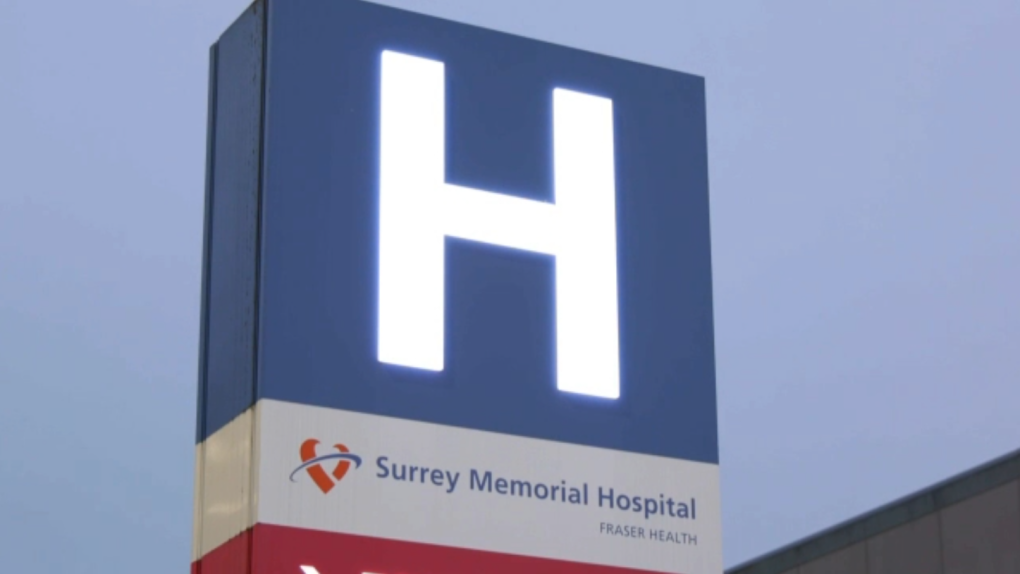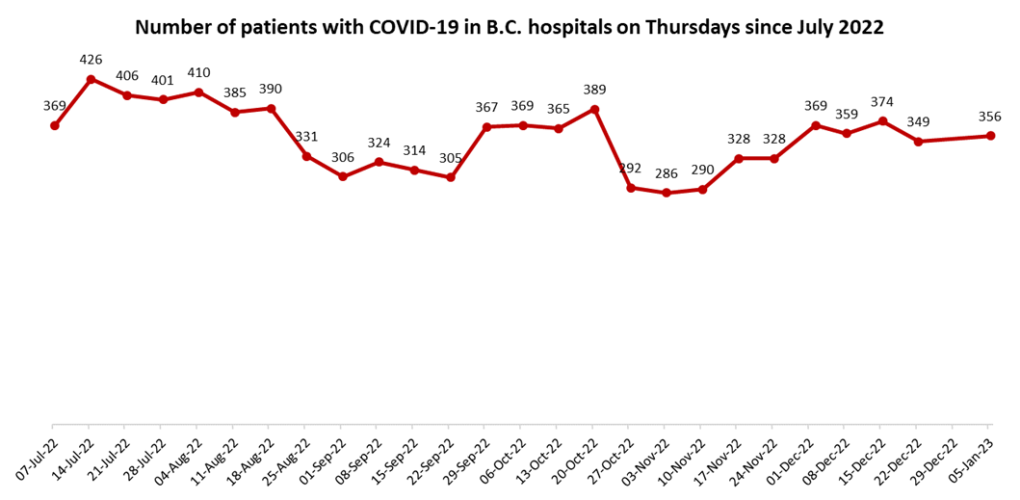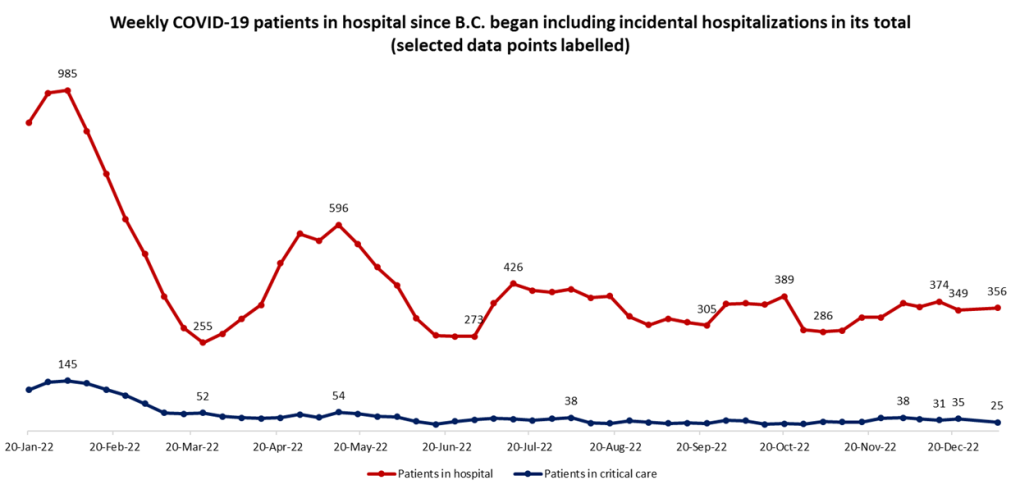Number in hospital with COVID-19 steady as B.C. reopens EOCs
 A sign at the entrance to Surrey Memorial Hospital is seen on Saturday, Feb. 5, 2022. (CTV)
A sign at the entrance to Surrey Memorial Hospital is seen on Saturday, Feb. 5, 2022. (CTV)
As British Columbia reopens hospital emergency operations centres originally set up to deal with COVID-19, the disease's burden on the provincial health care system remains steady.
There were 356 people in B.C. hospitals with a positive COVID-19 diagnosis as of Thursday, up slightly from the last time the B.C. Centre for Disease Control released data two weeks ago.
 The number of people in hospital with COVID-19 on Thursdays in B.C. since July 7, 2022. The full trendline dating back to January 2022 can be seen in the graph at the bottom of this story. (CTV)
The number of people in hospital with COVID-19 on Thursdays in B.C. since July 7, 2022. The full trendline dating back to January 2022 can be seen in the graph at the bottom of this story. (CTV)
For the past six months, the coronavirus has placed a remarkably consistent amount of strain on the provincial health care system. As seen in the graph, the number of patients in hospital with COVID-19 has not risen higher than 426 nor fallen below 286 since July.
That range is a far cry from the extremes seen earlier in 2022, when B.C.'s hospital census rose as high as 985 and fell as low as 255. The full graph showing long-term trends in hospitalizations is embedded at the bottom of this story.
The number of people in hospital reported by the BCCDC each week includes both those who require treatment because of serious cases of COVID-19 and those who are hospitalized for other reasons and test positive incidentally.
Health officials estimate that between 40 and 50 per cent of hospitalizations are caused by COVID-19, while the rest are incidental.
EOC REOPENINGS 'PROACTIVE'
On Friday, Health Minister Adrian Dix cited the ongoing respiratory illness season and the surge in demand for hospital care typically seen in January as reasons for reopening emergency operations centres at 20 hospitals across the province.
The health minister called the move a "proactive step," and said there were 10,226 patients in provincial acute care beds as of Thursday. The province has 11,680 beds total, including 2,500 "surge beds."
Based on those figures, it appears that COVID-positive patients accounted for roughly 3.5 per cent of the province-wide total Thursday.
Other illnesses, including influenza and RSV, have been bigger drivers of health-care-system use than COVID-19 this fall and winter.
Still, with the so-called "Kraken" subvariant of the Omicron strain of SARS-CoV-2 present in B.C. and causing surges in the U.S. and elsewhere, rising COVID-19 hospitalizations are a possibility in the coming weeks.
LATEST CASE DATA
The BCCDC releases data on COVID-19 test results on a delay. The most recent data, released Thursday, shows 693 new infections were confirmed in the province from Dec. 25 to 31.
That's the highest weekly total the BCCDC has reported since mid-October, and a significant increase from the 556 new cases the province confirmed from Dec. 18 to 24.
Because the BCCDC only includes the results of lab-based PCR tests in its weekly updates, severely limits the availability of PCR testing and does not count reinfections in its data, official case counts do not reflect the true spread of COVID-19 in B.C.
Experts estimate that infection totals released by the BCCDC are off by roughly 100-fold.
The province's wastewater monitoring program helps provide a sense of the spread of the coronavirus in the overall population, and it shows a similar pattern to the official case counts.
As of the week that ended Dec. 31, four of the five wastewater treatment plants in the Lower Mainland were seeing increasing concentrations of SARS-CoV-2, and had seen such increases for several weeks straight.
If B.C. is at the beginning of a wave of new infections caused by the XBB.1.5 "Kraken" subvariant, both the official case count and wastewater concentrations will continue to grow in the coming weeks, with the hospital population – typically a lagging indicator – likely to follow.
 The number of people in hospital with COVID-19 in B.C. on Thursdays since the province transitioned to a "hospital census" model that includes incidental cases is shown. Selected data points are labeled. (CTV)
The number of people in hospital with COVID-19 in B.C. on Thursdays since the province transitioned to a "hospital census" model that includes incidental cases is shown. Selected data points are labeled. (CTV)
CTVNews.ca Top Stories

BREAKING Another suspect arrested in Toronto Pearson airport gold heist: police
Another suspect is in custody in connection with the gold heist at Toronto Pearson International Airport last year, police say.
Poilievre-led government 'would never' use notwithstanding clause on abortion, his office says
A Conservative government led by Pierre Poilievre would not legislate on, nor use the notwithstanding clause, on abortion, his office says, as anti-abortion protesters gather on Parliament Hill.
Why these immigrants to Canada say they're thinking about leaving, or have already moved on
For some immigrants, their dreams of permanently settling in Canada have taken an unexpected twist.
Ontario family receives massive hospital bill as part of LTC law, refuses to pay
A southwestern Ontario woman has received an $8,400 bill from a hospital in Windsor, Ont., after she refused to put her mother in a nursing home she hated -- and she says she has no intention of paying it.
Here are the ultraprocessed foods you most need to avoid, according to a 30-year study
Studies have shown that ultraprocessed foods can have a detrimental impact on health. But 30 years of research show they don’t all have the same impact.
Miss Teen USA steps down just days after Miss USA's resignation
Miss Teen USA resigned Wednesday, sending further shock waves through the pageant community just days after Miss USA said she would relinquish her crown.
Cyclist strikes child crossing the street to catch school bus in Montreal
A video circulating on social media of a young girl being hit by a bike has some calling for better safety and more caution when designing bike lanes in the city. The video shows a four-year-old girl crossing Jeanne-Mance Street in Montreal's Plateau neighbourhood to get on a school bus stopped on the opposite side of the street
Trump hush money trial: Play-by-play on Day 2 of Stormy Daniels testimony
Adult film star Stormy Daniels took the stand for a second time Thursday as former U.S. president Donald Trump's hush money case continues in Manhattan.
B.C. wildfires likely to spread with weekend temperatures expected to soar, province says
Wildfire and emergency management officials in British Columbia are urging residents to be prepared for increased fire activity as temperatures are expected to soar above 30 C in parts of the province this weekend.
































